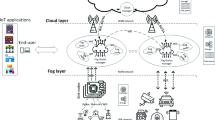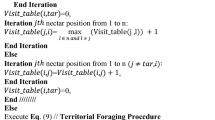Abstract
Fog computing paradigm attempts to provide diverse processing at the edge of IoT networks. Energy usage being one of the important elements that may have a direct influence on the performance of fog environment. Effective scheduling systems, in which activities are mapped on the greatest feasible resources to meet various competing priorities, can reduce energy use. Consequently, a hybrid discrete optimization method called HDSOS-GOA, which uses the Dynamic voltage and frequency scaling (DVFS) approach, is proposed to handle scientific workflow scheduling challenges in the fog computing environment. HDSOS-GOA combines the search qualities of Symbiotic Organisms Search (SOS) and the Grasshopper Optimization Algorithm (GOA) algorithms and the selection of these algorithms for performing workflow scheduling is based on the probability calculated by the learning automata. The HEFT method is used to determine the task sequence. Our solution focuses on reducing the energy consumption of the scheduling process by reducing the number of Virtual Machines required for workflow execution in addition to optimizing the makespan. Comprehensive experiments are carried out on four different scientific workflows with different sizes with and without deadline constraints to evaluate the performance of the suggested scheduling strategy. The results of the experiments show that scheduling with the suggested approach outperforms other well-known metaheuristic algorithms.












Similar content being viewed by others
Data availability
Data generated during the current study are available from the corresponding author upon reasonable request.
References
Abd Elaziz M, Abualigah L, Attiya I (2021) "Advanced optimization technique for scheduling IoT tasks in cloud-fog computing environments. Futur Gener Comput Syst 124(142–154):2021
Abdullahi M, Ngadi MA (2016) Hybrid symbiotic organisms search optimization algorithm for scheduling of tasks on cloud computing environment. PLoS ONE 11(6):e0158229
Abdullahi M, Ngadi MA, Dishing SI (2017) Chaotic symbiotic organisms search for task scheduling optimization on cloud computing environment. In: 2017 6th ICT International Student Project Conference (ICT-ISPC), 2017, pp 1–4
Abualigah L, Diabat A (2021) A novel hybrid antlion optimization algorithm for multi-objective task scheduling problems in cloud computing environments. Clust Comput 24(1):205–223
Aburukba RO, AliKarrar M, Landolsi T, El-Fakih K (2019) Scheduling Internet of Things requests to minimize latency in hybrid Fog-Cloud computing. Futur Gener Comput Syst 111:539–551
Ahmed AN, Van Lam T, Hung ND, Van Thieu N, Kisi O, El-Shafie A (2021) A comprehensive comparison of recent developed meta-heuristic algorithms for streamflow time series forecasting problem. Appl Soft Comput 105:107282
Ahmed OH, Lu J, Xu Q, Ahmed AM, Rahmani AM, Hosseinzadeh M (2021) Using differential evolution and Moth-Flame optimization for scientific workflow scheduling in fog computing. Appl Soft Comput 112:107744
Anwar N, Deng H (2018) A hybrid metaheuristic for multi-objective scientific workflow scheduling in a cloud environment. Appl Sci 8(4):538
Arora N, Banyal RK (2021) Workflow scheduling using particle swarm optimization and gray wolf optimization algorithm in cloud computing. Concurr Comput Pract Exp 33(16):e6281
Baker T et al (2020) 2020 A secure fog-based platform for SCADA-based IoT critical infrastructure. Software Pract Exp 50(5):503–518
Cheng M-Y, Prayogo D (2014) Symbiotic organisms search: a new metaheuristic optimization algorithm. Comput Struct 139:98–112
Cheng M-Y, Cao M-T, Herianto JG (2020) Symbiotic organisms search-optimized deep learning technique for mapping construction cash flow considering complexity of project. Chaos, Solitons Fractals 138:109869
Chhabra A, Sahana SK, Sani NS, Mohammadzadeh A, Omar HA (2022) Energy-aware bag-of-tasks scheduling in the cloud computing system using hybrid oppositional differential evolution-enabled whale optimization algorithm. Energies 15(13):4571
Choe S, Li B, Ri I, Paek C, Rim J, Yun S (2018) Improved hybrid symbiotic organism search task-scheduling algorithm for cloud computing. KSII Trans Internet Inf Syst (TIIS) 12(8):3516–3541
De Maio V, Kimovski D (2020) Multi-objective scheduling of extreme data scientific workflows in Fog. Futur Gener Comput Syst 106:171–184
Deelman E et al (2015) Pegasus, a workflow management system for science automation. Fut Gener Comput Syst 46:17–35
Dosoglu MK, Guvenc U, Duman S, Sonmez Y, Kahraman HT (2018) Symbiotic organisms search optimization algorithm for economic/emission dispatch problem in power systems. Neural Comput Appl 29(3):721–737
Durillo JJ, Prodan R, Barbosa JG (2015) Pareto tradeoff scheduling of workflows on federated commercial clouds. Simul Model Pract Theory 58:95–111
Ezugwu AE, Adewumi AO (2017) Soft sets based symbiotic organisms search algorithm for resource discovery in cloud computing environment. Futur Gener Comput Syst 76:33–50
Ezugwu AE, Prayogo D (2019) Symbiotic organisms search algorithm: theory, recent advances and applications. Expert Syst Appl 119:184–209
Fard HM, Prodan R, Barrionuevo JJD, Fahringer T, (2012) A Multi-objective Approach for Workflow Scheduling in Heterogeneous Environments. In: 2012 12th IEEE/ACM International Symposium on Cluster, Cloud and Grid Computing (ccgrid 2012), 2012, pp 300–309
Figueiredo EM, Ludermir TB, Bastos-Filho CJ (2016) Many objective particle swarm optimization. Inf Sci 374:115–134
Fohler G, "How different are offline and online scheduling?," Gerhard Fohler, RTSOPS, 2011
Ghobaei-Arani M, Souri A, Safara F, Norouzi M (2020) An efficient task scheduling approach using moth-flame optimization algorithm for cyber-physical system applications in fog computing. Trans Emerg Telecommun Technolo 31(2):e3770
Gupta S, Deep K, Mirjalili S, Kim JH (2020) A modified sine cosine algorithm with novel transition parameter and mutation operator for global optimization. Expert Syst Appl 154:113395
Han P, Du C, Chen J, Ling F, Du X (2021) Cost and makespan scheduling of workflows in clouds using list multiobjective optimization technique. J Syst Architect 112:101837
Hao Y, Cao J, Ma T, Ji S (2019) Adaptive energy-aware scheduling method in a meteorological cloud. Futur Gener Comput Syst 101:1142–1157
Huang Q, Su S, Li J, Xu P, Shuang K, Huang X (2012) Enhanced energy-efficient scheduling for parallel applications in cloud. In 2012 12th IEEE/ACM International Symposium on Cluster, Cloud and Grid Computing (ccgrid 2012), 2012, pp 781–786: IEEE
Javaheri D, Gorgin S, Lee J-A, Masdari M (2022) An improved discrete harris hawk optimization algorithm for efficient workflow scheduling in multi-fog computing. Sustain Comput Inf Syst 36:100787
Keshanchi B, Souri A, Navimipour NJ (2017) An improved genetic algorithm for task scheduling in the cloud environments using the priority queues: formal verification, simulation, and statistical testing. J Syst Softw 124:1–21
Kishor A, Singh PK, Prakash J (2016) NSABC: non-dominated sorting based multi-objective artificial bee colony algorithm and its application in data clustering. Neurocomputing 216:514–533
Kumar N, Vidyarthi DP (2019) A green SLA constrained scheduling algorithm for parallel/scientific applications in heterogeneous cluster systems. Sustain Comput Inf Syst 22:107–119
Lin B, Guo W, Xiong N, Chen G, Vasilakos AV, Zhang H (2016) A pretreatment workflow scheduling approach for big data applications in multicloud environments. IEEE Trans Netw Serv Manage 13(3):581–594
Lin J, Yu W, Zhang N, Yang X, Zhang H, Zhao W (2017) A survey on internet of things: architecture, enabling technologies, security and privacy, and applications. IEEE Internet Things J 4(5):1125–1142
Liu X-F, Zhan Z-H, Deng JD, Li Y, Gu T, Zhang J (2016) An energy efficient ant colony system for virtual machine placement in cloud computing. IEEE Trans Evol Comput 22(1):113–128
Mahmud R, Buyya R, (2019) Modelling and simulation of fog and edge computing environments using iFogSim toolkit. Fog and edge computing: Principles and paradigms, pp 1–35
Manasrah AM, Ba Ali H (2018) Workflow scheduling using hybrid GA-PSO algorithm in cloud computing. Wirel Commun Mobile Comput 2018:1934784
Mao L, Li Y, Peng G, Xu X, Lin W (2018) A multi-resource task scheduling algorithm for energy-performance trade-offs in green clouds. Sustain Comput Inf Syst 19:233–241
Marouf I (2019) Task scheduling optimization in cloud computing using multi-objective evolutionary algorithms with user-in-the-loop. Birzeit University, Palestine
Mirjalili S, Jangir P, Mirjalili SZ, Saremi S, Trivedi IN (2017) Optimization of problems with multiple objectives using the multi-verse optimization algorithm. Knowl-Based Syst 134:50–71
Misra S, Saha N (2019) Detour: dynamic task offloading in software-defined fog for IoT applications. IEEE J Sel Areas Commun 37(5):1159–1166
Mohammadzadeh A, Masdari M (2021) Scientific workflow scheduling in multi-cloud computing using a hybrid multi-objective optimization algorithm. J Ambient Intell Human Comput 14:3509–3529
Mohammadzadeh A, Masdari M, Gharehchopogh FS, Jafarian A (2020) Improved chaotic binary grey wolf optimization algorithm for workflow scheduling in green cloud computing. Evolut Intell 14:1997–2025
Mohammadzadeh A, Masdari M, Gharehchopogh FS, Jafarian A (2020) A hybrid multi-objective metaheuristic optimization algorithm for scientific workflow scheduling. Clust Comput 24:1429–1503
Mohammadzadeh A, Masdari M, Gharehchopogh FS (2021) Energy and cost-aware workflow scheduling in cloud computing data centers using a multi-objective optimization algorithm. J Netw Syst Manag 29(3):31
Mohammadzadeh A, Masdari M, Gharehchopogh FS, Jafarian A (2021) A hybrid multi-objective metaheuristic optimization algorithm for scientific workflow scheduling. Cluster Comput 24(2):1479–1503
Mohammadzadeh A, Masdari M, Gharehchopogh FS (2021) Energy and cost-aware workflow scheduling in cloud computing data centers using a multi-objective optimization algorithm. J Netw Syst Manage 29(3):1–34
Montazerolghaem A, Khosravi M, Rezaee F, Khayyambashi MR (2022) An optimal workflow scheduling method in cloud-fog computing using three-objective Harris-Hawks algorithm. In: 2022 12th International Conference on Computer and Knowledge Engineering (ICCKE), 2022, pp 300–306
Muhammad-Bello BL, Aritsugi M (2018) A robust algorithm for deadline constrained scheduling in IaaS Cloud environment. IEICE Trans Inf Syst 101(12):2942–2957
Nguyen BM, Thi Thanh BinhDo Son HB (2019) Evolutionary algorithms to optimize task scheduling problem for the IoT based bag-of-tasks application in cloud–fog computing environment. Appl Sci 9(9):1730
Nguyen D-T, Le-Hoai L, Tarigan PB, Tran D-H (2021) Tradeoff time cost quality in repetitive construction project using fuzzy logic approach and symbiotic organism search algorithm. Alexandria Eng J 61(2):1499–1518
Paknejad P, Khorsand R, Ramezanpour M (2021) Chaotic improved PICEA-g-based multi-objective optimization for workflow scheduling in cloud environment. Futur Gener Comput Syst 117:12–28
Ren J, Guo H, Xu C, Zhang Y (2017) Serving at the edge: a scalable IoT architecture based on transparent computing. IEEE Netw 31(5):96–105
Rezvanian A, Moradabadi B, Ghavipour M, Daliri Khomami MM, Meybodi MR (2019) Introduction to Learning Automata Models. In: Learning Automata Approach for Social Networks. Springer. pp 1–49
Rodriguez MA, Buyya R (2014) Deadline based resource provisioningand scheduling algorithm for scientific workflows on clouds. IEEE Trans Cloud Comput 2(2):222–235
Saeedi S, Khorsand R, Ghandi Bidgoli S, Ramezanpour M (2020) Improved many-objective particle swarm optimization algorithm for scientific workflow scheduling in cloud computing. Comput Ind Eng 147:106649
Sanaj MS, Joe Prathap PM (2021) An efficient approach to the map-reduce framework and genetic algorithm based whale optimization algorithm for task scheduling in cloud computing environment. Mater Today Proc 37:3199–3208
Saremi S, Mirjalili S, Lewis A (2017) Grasshopper optimisation algorithm: theory and application. Adv Eng Softw 105:30–47
Talukder AKA, Kirley M, Buyya R (2009) Multiobjective differential evolution for scheduling workflow applications on global grids. Concurr Comput Pract Exp 21(13):1742–1756
Tang Z, Qi L, Cheng Z, Li K, Khan SU, Li K (2016) An energy-efficient task scheduling algorithm in DVFS-enabled cloud environment. J Grid Comput 14(1):55–74
Valappil Thekkepuryil JK, Suseelan DP, Keerikkattil PM (2021) An effective meta-heuristic based multi-objective hybrid optimization method for workflow scheduling in cloud computing environment. Cluster Comput 24(3):2367–2384
Wang Y, Zuo X (2021) An effective cloud workflow scheduling approach combining PSO and idle time slot-aware rules. IEEE/CAA J Automatica Sinica 8(5):1079–1094
Wang S, Zhao T, Pang S (2020) Task scheduling algorithm based on improved firework algorithm in fog computing. IEEE Access 8:32385–32394
Wang P, Lei Y, Agbedanu PR, Zhang Z (2020) Makespan-driven workflow scheduling in clouds using immune-based PSO algorithm. IEEE Access 8:29281–29290
Wu C-M, Chang R-S, Chan H-Y (2014) A green energy-efficient scheduling algorithm using the DVFS technique for cloud datacenters. Futur Gener Comput Syst 37:141–147
Yang M, Ma H, Wei S, Zeng Y, Chen Y, Hu Y (2020) A multi-objective task scheduling method for fog computing in cyber-physical-social services. IEEE Access 8:65085–65095
Yu J, Kirley M, Buyya R (2007) Multi-objective planning for workflow execution on grids. In: 2007 8th IEEE/ACM International Conference on Grid Computing, pp 10–17: IEEE
Zeng L, Veeravalli B, Li X (2015) SABA: A security-aware and budget-aware workflow scheduling strategy in clouds. J Parallel Distrib Comput 75:141–151
Zeng L, Veeravalli B, Zomaya AY (2015) An integrated task computation and data management scheduling strategy for workflow applications in cloud environments. J Netw Comput Appl 50:39–48
Zhu Z, Zhang G, Li M, Liu X (2015) Evolutionary multi-objective workflow scheduling in cloud. IEEE Trans Parallel Distrib Syst 27(5):1344–1357
Zivkovic M, Bezdan T, Strumberger I, Bacanin N, Venkatachalam K (2020) Improved harris hawks optimization algorithm for workflow scheduling challenge in cloud–edge environment. In: Computer Networks, Big Data and IoT: Proceedings of ICCBI 2020: Springer, 2021, pp 87–102
Funding
This research received no specific grant from any funding agency in the public, commercial, or not-for-profit sectors.
Author information
Authors and Affiliations
Contributions
AM, MAZ, PHS, JA, and Amit Chhabra contributed to the design and implementation of the research, to the analysis of the results and the writing of the manuscript. All authors have read and agreed to the published version of the manuscript.
Corresponding author
Ethics declarations
Conflict of interests
The authors have no competing interests to declare that are relevant to the content of this article.
Additional information
Publisher's Note
Springer Nature remains neutral with regard to jurisdictional claims in published maps and institutional affiliations.
Rights and permissions
Springer Nature or its licensor (e.g. a society or other partner) holds exclusive rights to this article under a publishing agreement with the author(s) or other rightsholder(s); author self-archiving of the accepted manuscript version of this article is solely governed by the terms of such publishing agreement and applicable law.
About this article
Cite this article
Mohammadzadeh, A., Akbari Zarkesh, M., Haji Shahmohamd, P. et al. Energy-aware workflow scheduling in fog computing using a hybrid chaotic algorithm. J Supercomput 79, 18569–18604 (2023). https://doi.org/10.1007/s11227-023-05330-z
Accepted:
Published:
Issue Date:
DOI: https://doi.org/10.1007/s11227-023-05330-z




